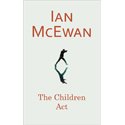 IN 140 CHARACTERS OR LESS:
IN 140 CHARACTERS OR LESS:
An elegant and intelligent examination of the messiness of being human.
Who’s it for:
This is a work of contemporary realism, perfect for adults with an interest in law, religion, marriage and rational thought.
What the back cover says:
Fiona Maye is a leading High Court judge, presiding over cases in the family court. She is renowned for her fierce intelligence, exactitude and sensitivity. But her professional success belies private sorrow and domestic strife. There is the lingering regret of her childlessness, and now, her marriage of thirty years is in crisis.
At the same time, she is called on to try an urgent case: for religious reasons, a beautiful seventeen-year-old boy, Adam, is refusing the medical treatment that could save his life, and his devout parents share his wishes. Time is running out. Should the secular court overrule sincerely held faith? In the course of reaching a decision Fiona visits Adam in hospital – an encounter which stirs long-buried feelings in her and powerful new emotions in the boy. Her judgment has momentous consequences for them both.
What I say:
As a parent, it is difficult to imagine sacrificing my child’s welfare for the sake of religious or personal beliefs. Yet I must accept it can and does happen.
In 2009, an Australian couple was found guilty of manslaughter for denying their nine month old daughter conventional medicine for severe eczema in favour of homeopathic treatments.
Thus, the premise of McEwan’s book is both plausible and real. Indeed, I understand it is based on a real-life case in the United Kingdom, and McEwan writes about the legal process with authenticity and credibility.
But this novel is not about the moral rights and wrongs of religious or social beliefs, it is about the limitations of rational thought.
Fiona hands down what she believes to be the legally correct decision that provides for Adam’s welfare, yet it triggers a chain of events that are beyond logic and rationality.
McEwan’s prose is as precise and intelligent as her chief protagonist. ‘It was her impression, though the facts did not bear it out, that in the late summer of 2012, marital or partner breakdown and distress in Great Britain swelled like a freak spring tide, sweeping away entire households, scattering possessions and hopeful dreams, drowning those without a powerful instincts for survival.’
McEwan is economic with his words – perhaps too economic. At just over 200 pages, this book almost falls into the novella category. Frustratingly, I felt there were opportunities for the ideas to be extended and for Fiona’s thought processes to be more deeply investigated. But this is a minor quibble.
Overall, ‘The Children Act’ intelligently weaves the Fiona’s personal and professional story and ultimately shows us that such compartmentalisation of life is an artifice; being human is a messy business where lines are constantly blurred and crossed.
Buy The Children Act from Book Depository or Booktopia
